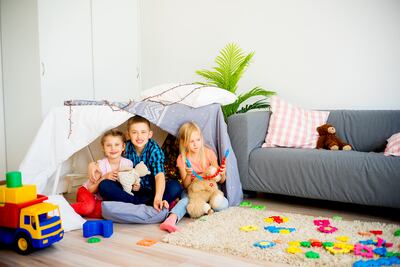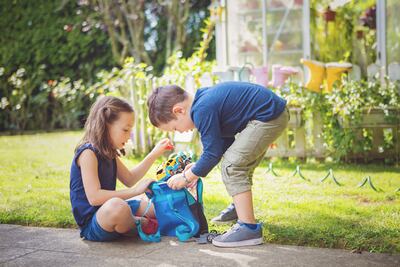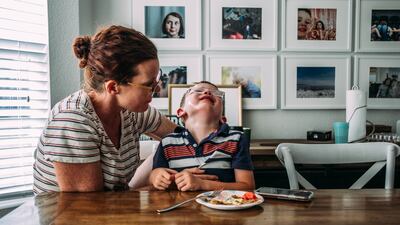We live in a culture that glorifies success. But, when it comes to our children’s mental health, experts say it’s time to slow down, surrender to the present and give children the time and space to be … well, children.
“Society's relentless pursuit of productivity and success significantly impacts children's mental health,” says Gordon Shaw, a psychologist at The LightHouse Centre for Wellbeing, Dubai. According to Shaw, the key to protecting children’s well-being lies in protecting their childhoods. He suggests that balancing the pursuit of achievement with a more holistic approach to child-rearing is important for raising resilient and emotionally healthy individuals.
It’s all about embracing simplicity, going back to basics and forming connections. Shaw says: “It’s an approach that nurtures creativity, imagination and critical thinking.”
To find out more about how eager parents can help, The National asked a range of experts for their tips and techniques.
Scrap schedules

“The over-scheduled lives imposed by societal norms leave little room for unstructured play and leisure, which is vital for a child's cognitive and emotional development,” says Shaw. Often, children are shuttled from one activity to the next and, as a result, are constantly overstimulated.
co-founder, The Wise Parent
In the long-term, as they grow older and become used to a certain pace, they often end up seeking external stimulation or entertainment as they’re not comfortable with the stillness and monotony of everyday life.
“Boredom is a good thing,” explains Karen Abou Jaoude, parent coach and co-founder of The Wise Parent. “Boredom invites creativity, critical thinking and problem-solving. When left to their own devices, kids find creative ways to entertain themselves. The more they do this, the better they get at it.”
Instead of cramming schedules with activities, play dates and outings, parents should focus on the quality of experiences over the quantity. Leaning into a slower pace of life not only allows children to be more mindful, but also helps them develop resilience, self-awareness and emotional intelligence – all of which sets them up for success as they grow older.
Shaw adds: “Choosing less over more and prioritising slowness over productivity can be beneficial.”
Streamline screentime

One of the toughest universal parenting challenges is reducing screentime and implementing technology boundaries. “The pervasive use of technology, encouraged by a business-centric culture, exposes children to excessive screen time and potential adverse effects on mental well-being,” explains Shaw.
Sarah Raslan, co-founder of The Wise Parent, adds: “The major problem when it comes to screentime, is that it gives our children less time to explore their world. It’s passive time spent, instead of active and engaged time doing something that would positively impact them developmentally.”
Raslan points out that excessive screentime can not only negatively impact sleep, but is also detrimental to social skills and overall well-being. To combat this, she advises parents to implement “firm and loving boundaries” around screentime, but emphasises the need for some flexibility.
“The key here is predictability,” Raslan explains. “When screentime is scattered throughout the day or week, a child will never know when they are allowed to watch. Whereas, if there is more predictability, including how long and when they’re allowed to watch, a child will be less likely to ask for it at random moments. This leads to a decrease in power struggles and meltdowns around screentime.”
Open communication
Creating a supportive environment where children feel comfortable expressing their thoughts and emotions will encourage honesty and open conversations for years to come.
“Sharing problems or difficult feelings together can help children overcome any issues, whilst feeling supported and safe,” says Sophie Jones, who has worked as a child development professional and parenting adviser for more than 20 years.
She explains that if parents share their own feelings, it will help their child understand that having difficult feelings or emotions is OK.
Shaw agrees: “It fosters trust and strengthens the parent-child bond. It allows parents to identify and address potential mental health concerns early, promoting emotional resilience in children,” he explains.
Prioritise play

Play is essential for children’s social, problem-solving, cognitive and emotional development. Parents of younger children should focus on building plenty of unstructured play into the day.
Unstructured play allows little ones the freedom to explore, create and discover without a set of predetermined rules, limits or guidelines. This gives children the opportunity to explore their own interests and imagination organically and intuitively, without adult intervention.
“Play offers a natural outlet for stress relief, enhancing children's mental and emotional resilience, and regularly engaging in play can have long-term, lasting benefits,” says Shaw.
Jones agrees and reminds parents that even school-age children need time dedicated to play to support relationships with friends, learn about rules and enhance creativity.
Validate emotions
Validating children’s emotions and building emotional literacy can have a major impact on overall well-being. “Emotions can be overwhelming and confusing for little ones,” says Abou Jaoude. “One of our jobs as parents is to support our children as they navigate the whirlwind of their emotions by helping them identify the emotions, validating they exist and believing their experiences are real to them,” she adds.
She goes on to explain that when we support children in understanding their feelings, they feel less confused about what is happening inside of them. And, if we go one step further and validate the emotions, it instils a sense of security.
“This might look like saying: ‘You’re feeling frustrated’, or ‘It’s OK to be angry’, or ‘You’re having a tough time right now’. This validation helps them feel safe and seen – which is a key factor in supporting mental health.”
Suss sleep
Sleep not only plays an important role in children’s growth and development, but is also vital to ensuring their minds and bodies function optimally. “Lack of sleep can have an effect on mood, concentration, behaviour, ability to learn new skills, appetite and emotional well-being,” says Jones.
To ensure little ones get the right amount of sleep, the child development expert recommends establishing distinct yet predictable daytime and bedtime routines to give balance to your child’s day. For example, spending time outdoors during the day, staying active and minimising screentime can have significant benefits to sleep quality.

